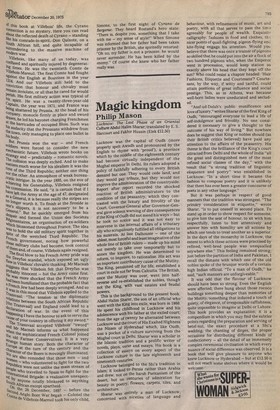Magic kingdom
Philip Mason
Culture Abdul Halim Sharar; translated by E. S. Lucknow: The Last Phase of an Oriental Harcourt and Fakhir Husain (Elek 02.50) Lucknow was the capital of Oudh (more properly spelt Awadh and pronounced by the English to rhyme with 'proud'), a province which by the middle of the eighteenth century had become virtually independent of the Mughal emperor In Delhi. Its rulers adopted a policy of faithfully adhering to every British demand but one. They would cede land, and they would pay tribute, but they would not improve the administration of the countryside. Report after report recorded the shocked reaction of British administrators to the condition of the peasantry, which they contrasted with the luxury and frivolity of the Court. Governor-General after Governor-General gave solemn warning of dire consequences if the King of Oudh did not mend his ways — but he took no notice and it was not easy to intervene in the internal affairs of a tributary ally who scrupulously fulfilled all obligations to his suzerain. At last Dalhousie — one of the ablest, most forceful and least imaginative of the whole line of British rulers — made up his mind not merely to take over temporarily but to annex the kingdom. He was determined to reform, to improve, to rationalise. His act was an important contributory cause of the Mutiny. The King, pensioned off for life, established a court in exile not far from Calcutta. The British, once the Mutiny was over, went into halfreverse and re-established the nobles, though not the King, with vast estates and feudal powers. This is the background to the present book. Abdul Halim Sharar, the son of an official who went with the King into exile, was born in 1860. He spent his childhood in Lucknow and his adolescence with his father at the exiled court; from the age of twenty he alternated between Lucknow and the court of His Exalted Highness' the Nizam of Hyderabad which, like Oudh, was a pocket of a culture surviving from the Mughal court in Delhi. Sharar was a scholar in the Islamic tradition and a prolific writer of novels, plays, verse and essays. His book is a collection of essays on every aspect of the Lucknow culture in the late eighteenth and nineteenth centuries. Lucknow belonged to the Shi'a tradition in Islam; it looked to Persia rather than Arabia and drew, not on the harsh Puritanism of the desert, but on centuries of admiration for beauty in poetry. flowers, carpets, tiles, and architecture. ' Sharar was entirely a man of Lucknow, niceties of language and concerned with behaviour, with refinements of music, art and poetry, with all that serves to pass the time agreeably for people of wealth. Exquisite calligraphy, fashions in food and clothes, th nicer points of quail-fighting, pigeon-flying and kite-flying engage his attention. Would yot. believe that there was once a trainer of pigeons so skilled that he could put into the air a flock of two hundred pigeons who, when the Emperor went in procession, would keep station so exactly above his head that they kept off the sun? Who could resist a chapter headed: `Hair Fashions, Etiquette and Courtesans'? Courtesans, by the way, if witty and tactful, could attain positions of great influence and social prestige. This, as in Athens, was because well-born ladies were uneducated and secluded.
"Asaf-ud-Dalah's public munificence and love of luxury," writes Sharar of the first King of Oudh, "encouraged everyone to lead a life of self-indulgence and frivolity. No one considered it necessary to give a thought to the outcome of his way of living." But nowhere does he suggest that King or nobles should (as their British critics believed) have paid any attention to the affairs of the peasantry. His theme is that the brilliance of the King's court attracted from Delhi and the whole of India "all the great and distinguished men of the most refined social classes of the day," with the 'result that "a strong tradition of linguistic eloquence and poetry" was established in Lucknow. "In a short time it became the fashion to compose poetry and it is unlikely that there has ever been a greater concourse of poets in any other language."
But it was perhaps in respect of good manners that the tradition was strongest. "The primary consideration in etiquette," wrote Sharar, "is to put oneself in second place. To stand up in order to show respect for someone, to give him the seat of honour, to sit with him respectfully, listen to him attentively and answer him with humility are all actions by which one tends to treat another as a superior. In the days of the monarchy in Lucknow, the extent to which these actions were practised by refined, well-bred people was unequalled anywhere else." This feeling remained strong; just before the partition of India and Pakistan, I recall the distaste with which one of the old nobles spoke of the brusque words of a certain high Indian official. "To a man of Oudh," he said, "such manners are unforgiveable."
It was odd that the flavour of Lucknow should have been so strong. Even the English were affected; there hung about those rococo buildings something deeper than memories of the Mutiny, something that induced a touch of gaiety, of elegance, of irresponsible raffishness, quite impossible to imagine at Delhi or Lahore. This book provides an explanation; it is a compendium in which you may find the subtler points regarding the preparation and serving of betel-nut, the exact procedure at a Shi'a wedding, the chanting of dirges, the proper occasions for distributing different kinds of confectionery — all the detail of an immensely complex ceremonial civilisation in which every nuance of social difference was observed. It is a book that will give pleasure to anyone who knew Lucknow or Hyderabad — but at £12.50 it will not reach some shelves where it would be welcome.


































 Previous page
Previous page